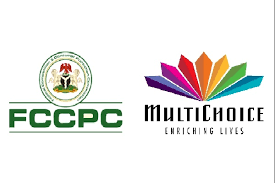
COURT DISMISSES MULTICHOICE’S SUIT AGAINST FCCPC OVER SUBSCRIPTION PRICE HIKE
MultiChoice Nigeria, the proprietors of DStv and GOtv, filed a lawsuit against the Federal Competition and Consumer Protection Commission (FCCPC) for interfering with its recent subscription price increase, but Justice James Omotosho of the Federal High Court Abuja dismissed the case.
Justice Omotoso declared in his ruling that the claim was an abuse of the legal system because Lagos State was already dealing with comparable cases.
He emphasised that the new petition is inappropriate because the plaintiff ought to have pursued its arguments in that court.
Nonetheless, Justice Omotoso pointed out that although the FCCPC has investigative powers under its founding act, the president must expressly grant it the ability to fix or suspend rates through a gazetted document.
The court was not furnished with any such delegation.
He went on to say that because Nigeria has a free market, service providers like MultiChoice are free to set their own tariffs, which customers are free to accept or reject.
The judge also decided that the FCCPC’s actions, which included ordering MultiChoice to halt its price hike, violated the company’s right to a fair trial and seemed to be biased.
The FCCPC’s assertion that MultiChoice had a dominant market position was also rejected by Justice Omotosho, who deemed the argument implausible.
The judge further ruled that FCCPC’s actions, including directing MultiChoice to suspend its price increase, breached the company’s right to fair hearing and appeared selectively targeted.
He warned that attempts to fix prices by regulatory bodies could scare off investors and harm the economy.
The court held that while the FCCPC may investigate market practices, it cannot impose price controls without proper legal backing.
He went on to say that Nigeria can function without the plaintiff’s services; thus, using them is optional and not necessary.
MultiChoice had increased subscription rates by up to 25% on March 1, 2025, citing inflation and operational cost pressures.
The FCCPC opposed the move, calling for regulatory review and threatening sanctions, prompting the legal challenge.
Justice Omotosho further added that while FCCPC is an agency of the federal government of Nigeria, it must act within its powers in line with relevant laws.
He said that even though FCCPC has power to declare market dominance and discriminatory prices against an entity, it must make pronouncement after carrying out investigation against such company.
The judge held that from the fact before the court, investigation had yet to begin before the FCCPC issued the suspension directive to the MultiChoice.
He said the FCCPC acted beyond its power by the directive it issued against MultiChoice price increase.
According to the judge, Nigeria operates a free market economy, where only the president of Nigeria has the exclusive powers to regulate prices and to set up a price control board against any defaulting foreign companies or regulated goods and services.
Justice Omotosho added that the FCCPC only has an advisory role on the issue of price fixing.
The judge said the powers of the president to regulate prices cannot be exercised by any other person or agency or body.
He stressed that the FCCPC can only regulate prices if the president delegates such powers to the Commission via an “instrument”.
Justice Omotosho held that MultiChoice, being a private company and due to the free market economy of Nigeria, its subscription prices cannot be restrained arbitrarily except only by an order of the President in line with relevant laws.
Omotosho further held that in line with relevant laws, if the president decides to fix prices , it must cover an entire industry and not just a single player.
The judge said while FCCPC has powers to make rules in respect of anti-competition, anti-consumer protection, among others, except the issue of fixing prices.
He recalled that in 2022, the Competition and Consumer Protection Tribunal, had ruled that MultiChoice had the right to increase its price while Nigerians had a choice to opt for other pay TV platforms.
Justice Omotosho said FCCPC appears to be targeting MultiChoice unfairly while ignoring the pricing of other pay TVs and online TVs like YouTube in Nigeria.
